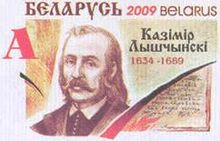Kazimierz Łyszczyński
Kazimierz Łyszczyński [ kaˈʑimjɛʂ wɨʂˈt͡ʂɨɲski ] (born March 4, 1634 in Lyschtschyzy , Poland , today Belarus ; † March 30, 1689 in Warsaw , Poland ) was a Polish philosopher and atheist .
Life
Kazimierz Łyszczyński was born in Lyschtschyzy in the Brest area, which is now part of Belarus . His family belonged to the Korczak coat of arms community and came from the Polish landed gentry . As a young man he belonged to the Jesuit order for eight years until 1666 , but used the time primarily to study philosophy . He then worked as a judge and in the military service of the Sapieha family , under whose banner he fought in the Northern War .
Because he wanted to marry his daughter to a relative, Łyszczyński was excommunicated in 1685. As a result, he began to deal critically with the clergy and wrote the atheistic work De non existentia Dei (German about the non-existence of God ). One of his neighbors, the local cupbearer Jan Brzoski, handed a copy of the work to a court about a year later, in order to have him denounced and charged. He had borrowed a large amount of money from Łyszczyński and wanted to avoid having to repay it. First Łyszczyński was sentenced by a church court. The Polish King Jan Sobieski , however, had the proceedings transferred to a commission of the Polish Reichstag under the direction of Stanisław Szczuka due to the religious freedom in the Kingdom of Poland . Some of the MPs spoke out in favor of dismissal, and Łyszczyński was also cooperative with the prosecutor Szymon Zabistowski. However, he was eventually sentenced to death , possibly primarily for political reasons . The first caused fire death was mitigated by the king and Łyszczyński beheaded on March 30, 1689 in the Old Town Market in Warsaw and his body was then cremated.
philosophy
In his work, begun in 1674, Kazimierz Łyszczyński stood as an atheist philosopher against religion . In it he anticipated the projection theory , which Ludwig Feuerbach wrote only two hundred years later , that God was merely a chimera made up by humans . He also postulated that the only point of faith was to be able to suppress the predominantly means-free masses. After all, religion is only a means of suppressing the population.
Aftermath
The anniversary of Kazimierz Łyszczyński's death, March 30th, is celebrated in Poland as the day of Polish atheism .
On April 20, 1989, a memorial stone in honor of Kazimierz Łyszczyński was erected in the village of Malyja Shchytniki in Selsavet Lyschtschyzy . The epitaph of the philosopher is immortalized in Belarusian on the stone . On March 4, 2009, the Ministry of Communication and Informatization of the Republic of Belarus issued a commemorative stamp.
Work (selection)
- De non existentia Dei
literature
- Constantin von Wurzbach : Lisziński, Kasimir . In: Biographisches Lexikon des Kaiserthums Oesterreich . 15th part. Imperial and Royal Court and State Printing Office, Vienna 1866, p. 241 ( digitized version ).
Web links
- Database on atheists and agnostics named after Kazimierz Łyszczyński (Polish)
- Quotes by Kazimierz Łyszczyńskis Wikiquote (Polish)
Individual evidence
- ↑ a b c d https://www.polenforschung.de/assets/downloads/Polenforschung/PoFoTa2009/PoFoTa2009Reader.pdf
- ^ Theo Mechtenberg: Atheist movement in Catholic Poland . In: Poland analyzes . German Poland Institute . February 3, 2015. Retrieved February 4, 2019.
- ↑ Article by Kaja Bryx about the memorial day in honor of Kazimierz Łyszczyński
- ^ Report by Wojciech Rudny on the day of Polish atheism
- ↑ Жертва языка и пера on vb.by (Russian)
| personal data | |
|---|---|
| SURNAME | Łyszczyński, Kazimierz |
| BRIEF DESCRIPTION | Polish philosopher |
| DATE OF BIRTH | March 4, 1634 |
| PLACE OF BIRTH | Lyschtschyzy |
| DATE OF DEATH | March 30, 1689 |
| Place of death | Warsaw |
